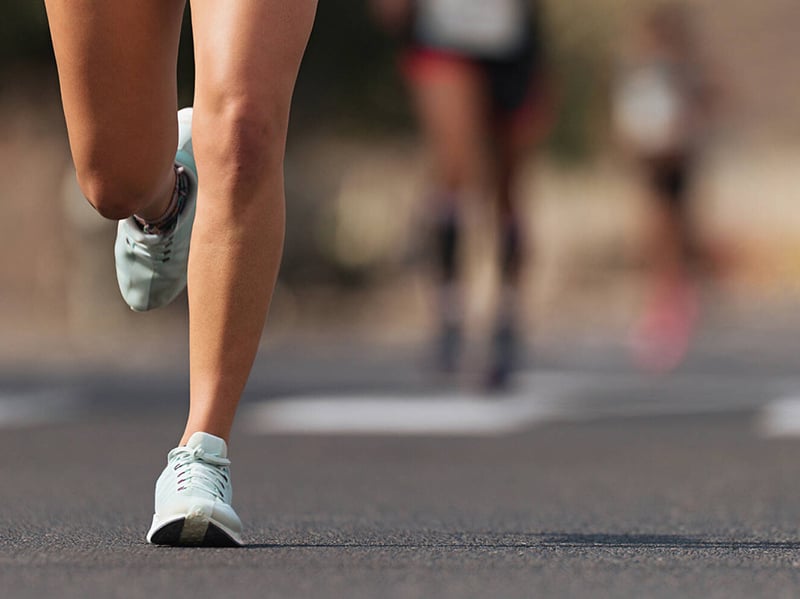Running and Depression: Can Running Make You Happy?
For most of my life, I’ve been drawn to running. It is a compulsion I cannot quite explain. But after not being able to run for close to two years recently (due to running injuries), there is one thing for sure: running makes me happy.

Turns out, there are a ton of research studies on the fascinating mental health benefits of running that support that yes, running can make you happy. And, running and depression do not go together. In fact, when I wasn’t able to run, I felt depressed.
When you exercise, it sets off a chain reaction of chemicals and hormones that spark positive moods and outlooks such as happiness, calm, confidence, and hope. It even spurs something called hope molecules, and of course, the infamous runner’s high.
Table of contents
- Does running make you happy?
- What is a runners high?
- How long does it take to get a runners high?
- How long does a runner’s high last?
- Does running release endorphins?
- Does running release dopamine?
- Does running release “hope molecules”?
- What are hope molecules?
- Does running relieve stress?
- Running and depression: can running help depression?
- How does running help with depression?
- Running and anxiety: can running help anxiety?
- So how can you reap these positive rewards of running? How can running make you happier?
Most mother runners and runners will attest that when they go for a run, they return a happier, more patient, and more productive person. Science shows that. This is a huge reason why we run—because it makes us better in the other spheres of our lives.
On my Instagram, I feature something called “Why I Run Wednesdays” where mother runners share the reasons why they run. It’s amazing to me how many moms have used running to overcome mental health challenges such as depression, postpartum depression, and anxiety.
I shudder to think of the person I would be today if I hadn’t had running in my life. Running has been a source of confidence and inspiration for me since I was 6 years old. I truly believe that if everyone ran (and had a dog in their lives), the world would be a happier, more peaceful place.
That’s my plan for world peace. But I digress. In this article, I’m going to delve into how running makes happy including an exploration of running and depression and anxiety.
Does running make you happy?
Yes, running makes you happy because it does release chemicals within the body that improve mood and outlook, and give people a sense of productivity and a boost in self-esteem.
In fact, a study of more than 8,000 runners, mining Strava and Parkrun data, found that 89 percent of runners said that running made them happier and reported a higher score on the Oxford Happiness Scale.
There are a host of things that happen inside your body that can contribute to why running makes you happy, some triggered what’s known as a runner’s high (more below).
How can you reap these positive rewards of running? How can running make you happier?
- Run at least 3 times a week for at least 30-45 minutes a session.
- Stay consistent with your training!
- Move at a moderate to intense pace some of the time.
- Recover well in between sessions.
- Run with others, listen to music, or take in the sounds and sights of nature.
- Focus on eating and sleeping well.
Does running relieve stress?
Ask any runner, and they will tell you one reason why they run is that it helps relieve stress. It is a time to clear your head, work through your thoughts, be in nature, get mood-boosting vitamin D, and oh—it releases another feel-good chemical in your body: norepinephrine,
When you run, your body releases the neurotransmitter norepinephrine, a chemical that moderates your brain’s response to stress. Norepinephrine increases one’s sense of well-being by supplying endorphins into your body’s system.
Running and depression: can running help depression?
Yes, running can help combat mild to moderate depression. Running, along with other tools such as therapy and medication, can help combat more severe cases of depression.
Studies have found a link between running and depression, including as part of an effective treatment. For instance, two small studies of regular runners found they were significantly less depressed than their non-running peers.
How does running help with depression?
Research shows that exercise like running may have an antidepressant effect through the creation of new brain cells (called neurogenesis). This may lead to improved brain performance, slowed or prevent cognitive decline, and blunt the brain’s response to physical and emotional stress. (Antidepressants also show the potential to grow new neurons and synapses).
The brain’s hippocampus, responsible for memory and learning, is also found to grow in volume.
Running and anxiety: can running help anxiety?
Yes, running releases neurotransmitters such as dopamine, norepinephrine, and serotonin which can give you a sense of calm and wellbeing, aiding in reducing anxiety and OCD tendencies.
Running also activates the frontal part of the brain responsible for executive function which can force people into the present rather than worrying about the future. It can also raise our sense of self-efficacy and control. This feeling then ripples into other parts of your life.
An Asics study during the pandemic supports this. It found that 82 percent of 14,000 runners said running helped clear their minds and 78 percent said they felt more in control and sane thanks to running.
FAQs About Running and Mental Health
What is a runners high?
A “runner’s high” is a neurological reward following moderate to intense exercise perhaps with the purpose of encouraging us to continue exercising. It is characterized by a short yet deeply euphoric state full of joy and calm.
And it is real. Research supports that a runner’s high is real.
However, new research shows that the primary cause of a runner’s high isn’t the release of endorphins, as once thought. Endorphins are a group of hormones that activates the body’s opiate receptors, causing an analgesic (pain-relief) effect.
No, a runner’s high is mostly caused by the increase in endocannabinoids, which are signaling molecules that help regulate processes, such as pain, memory, mood, immunity, and stress. Endocannabinoids are like the cannabinoids present in the cannabis sativa (C. sativa aka marijuana) plant. But the body makes them naturally (endo meaning within).
Unlike endorphins, endocannabinoids break through the blood-brain barrier triggering mood-improving neuromodulators causing psychoactive effects like reduced anxiety and calm.
Many people like 2020 Olympic bronze medalist in the marathon Molly Seidel, who suffers from anxiety, call a runner’s high their “flow state.”
Other new research also points to the reduced level of leptin, a brain hormone that tells you when you’ve had enough to eat, as partly responsible for the runner’s high. When you’re running, your leptin levels fall, sending “a hunger signal to the brain’s pleasure center to generate the rewarding effects of running,” according to the researchers.
How long does it take to get a runners high?
The length of a runner’s high depends on one’s fitness. It may take one person’ 30 minutes to reach a runner’s high while it may take another runner more than an hour. The fitter you are, the less time it takes to achieve a runner’s high.
The mean time to reach a runner’s high is 30-40 minutes.
How long does a runner’s high last?
The length of a runner’s high varies. For some runners, a runner’s high lasts a couple of minutes. For others, a runner’s high may last for a few miles. There are many variables that affect the length of a runner’s high just like there are many variables that impact how you may feel on a run.
Again, the fitter you are, the more likely you will experience a pro-longed runner’s high.
Does running release endorphins?
Yes, running does release endorphins—though endorphins are no longer believed to be the root cause of a runner’s high.
But running does release these hormones which reduce the perception of pain and act as sedatives. Endorphins are made in your brain, spinal cord, and other body parts, and are released by brain chemicals called neurotransmitters. They are actually similar to pain medications by binding to the same neuron receptors, but don’t lead to addiction or dependence.
Endorphins are known to briefly:
- Reduce pain
- Decrease stress, and
- Improve your general sense of well-being
Does running release dopamine?
Yes, running does release dopamine, according to research—another potential contributing factor to the runner’s high or just overall joy and reward of running. Dopamine is a neurotransmitter that leads to feeling good and motivated.
Does running release “hope molecules”?
But wait! There’s more. In addition to releasing feel-good things in your body such as endocannabinoids, endorphins, and dopamine—running can also release something called “hope molecules.”
I learned about these hope molecules by listening to Dan Harris’ 10 Percent Happier Podcast interview with Kelly McGonigal.
What are hope molecules?
McGonigal, a Stanford psychologist, explained that when we run (or perform any exercise) we release proteins called myokines into our bloodstream. They pass through the blood-brain barrier (like endocannabinoids) and change the structure of the brain in a way that has an antidepressant effect which makes us more “resilient to stress and trauma.”
Therefore, it is a permanent change (unlike the others mentioned above). The more intense you work out, the more hope molecules are pumped into your bloodstream.
I think this is the coolest thing I’ve heard in years. McGonigal, author of The Joy of Movement explains:
“Our muscles are like an endocrine organ. When you contract your muscles in any type of movement, they are secreting chemicals into your bloodstream that are really good for every system of your body; they’re great for your heart health, your immune function, and some of them can kill cancer cells. All the stuff we know exercise is good for. But a big part of these proteins and chemicals that are being released by your muscles, which are called myokines, has profound effects on the brain…
They travel to your brain, they cross the blood-brain barrier, and in your brain they can act as an antidepressant, like niacin can. They can make your brain more resilient to stress, they increase motivation, they help you learn from experience, and the only way you get these chemicals is by using your muscles. It’s part of how we become our best selves.”
If you want guidance with your running to maybe be happier 🙂 , please check out my run coaching services! Do you think running makes you happy?






